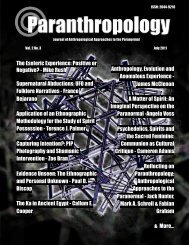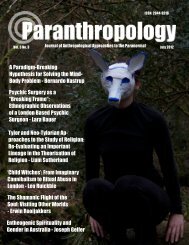Psi and Psychedelics - Paranthropology - Weebly
Psi and Psychedelics - Paranthropology - Weebly
Psi and Psychedelics - Paranthropology - Weebly
Create successful ePaper yourself
Turn your PDF publications into a flip-book with our unique Google optimized e-Paper software.
PARANTHROPOLOGY: JOURNAL OF ANTHROPOLOGICAL APPROACHES TO THE PARANORMAL VOL. 2 NO. 2<br />
<strong>Psychedelics</strong> & Spirituality<br />
Peter Barrett<br />
Over the decades since the discovery of dlysergic<br />
acid diethylamide (LSD) as a<br />
mind altering drug there has been a great<br />
deal written on the subject of psychedelics<br />
<strong>and</strong> spirituality. The main claim <strong>and</strong> topic<br />
of examination is that mystical<br />
experiences have been induced through<br />
the use of psychotropic drugs that are<br />
similar to accounts gained from non-drug<br />
using mystics across most of the major<br />
religious traditions. Various research has<br />
been carried out into this claim <strong>and</strong><br />
numerous writers have expressed views<br />
either supporting or rejecting the use of<br />
psychotropic drugs as a means to<br />
awakening spiritual consciousness. The<br />
following is a brief examination of the<br />
claim that psychedelic experiences might<br />
share some of the same phenomena as the<br />
spiritual.<br />
When considering any relationship<br />
between psychedelics <strong>and</strong> spirituality it is<br />
important to define what is meant by these<br />
terms. A definition of psychedelics is<br />
fairly straightforward, the term derives<br />
from the Greek ψυχή (psyche, "soul") <strong>and</strong><br />
δηλοῦν (deloun, "to manifest") <strong>and</strong> can be<br />
translated as "soul-manifesting".<br />
However, a psychedelic experience can be<br />
induced through various techniques,<br />
including sensory stimulation, sensory<br />
deprivation as well as psychotropic<br />
substances. These experiences have been<br />
described as hallucinations, changes of<br />
perception, synaesthesia, altered states of<br />
awareness, mystical states, <strong>and</strong> sometimes<br />
as states resembling psychosis.<br />
Nevertheless, the commonality between<br />
their properties is of an alternative state to<br />
normal everyday consciousness. An<br />
explanation of spirituality is more<br />
complex, but a simple dictionary<br />
definition is “the experiential side of<br />
religion as opposed to outward beliefs,<br />
practices <strong>and</strong> institutions, which deals<br />
with the inner spiritual depths of a<br />
person” (Goring, 1992:499). It can also<br />
refer to the experience of an ultimate or<br />
immaterial reality; <strong>and</strong> the awakening of<br />
an experience that transcends ordinary<br />
consciousness.<br />
In an essay entitled Drugs that<br />
Shape Men's Minds (1958), Aldous<br />
Huxley discussed the use of Lophophora<br />
williamsii or peyote within religious<br />
ceremonies, <strong>and</strong> suggested its usage<br />
facilitated a form of self-transcendence in<br />
two profound ways: (1) it introduces the<br />
user into the 'Other World' of visionary<br />
experience: <strong>and</strong> (2) gives the user a sense<br />
of solidarity with their fellow<br />
worshippers, human beings at large <strong>and</strong><br />
with the divine nature of things.<br />
According to Huxley, modern synthetic<br />
substances such as d-lysergic acid<br />
diethylamide (LSD) can duplicate the<br />
transcendent effects of peyote. (1999:154)<br />
Until its prohibition LSD was being used<br />
experimentally in small doses by<br />
psychotherapists. The drug was<br />
considered able to lower the barriers<br />
between the conscious <strong>and</strong> subconscious<br />
thus allowing the patient to look more<br />
deeply into the recesses of their mind.<br />
Huxley however went further <strong>and</strong><br />
proposed this deepening of selfknowledge<br />
took place against a<br />
background of visionary <strong>and</strong> even<br />
mystical-like experiences, suggesting that:<br />
“when administered in the right kind of<br />
psychological environment these chemical<br />
changers made possible a genuine<br />
religious experience”. (1999:154)<br />
In direct contrast, in Drugs,<br />
Mysticism <strong>and</strong> Make-Believe (1972), R C<br />
Zaehner argued there was little<br />
43 PARANTHROPOLOGY: JOURNAL OF ANTHROPOLOGICAL APPROACHES TO THE PARANORMAL




